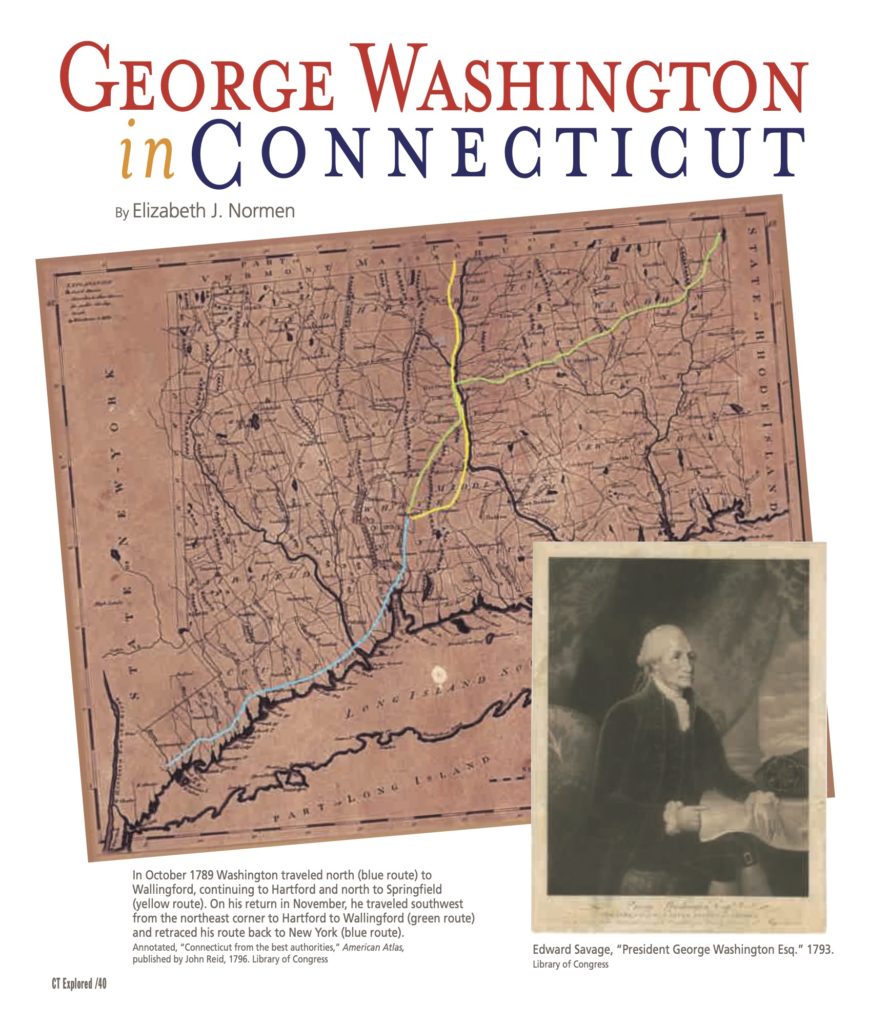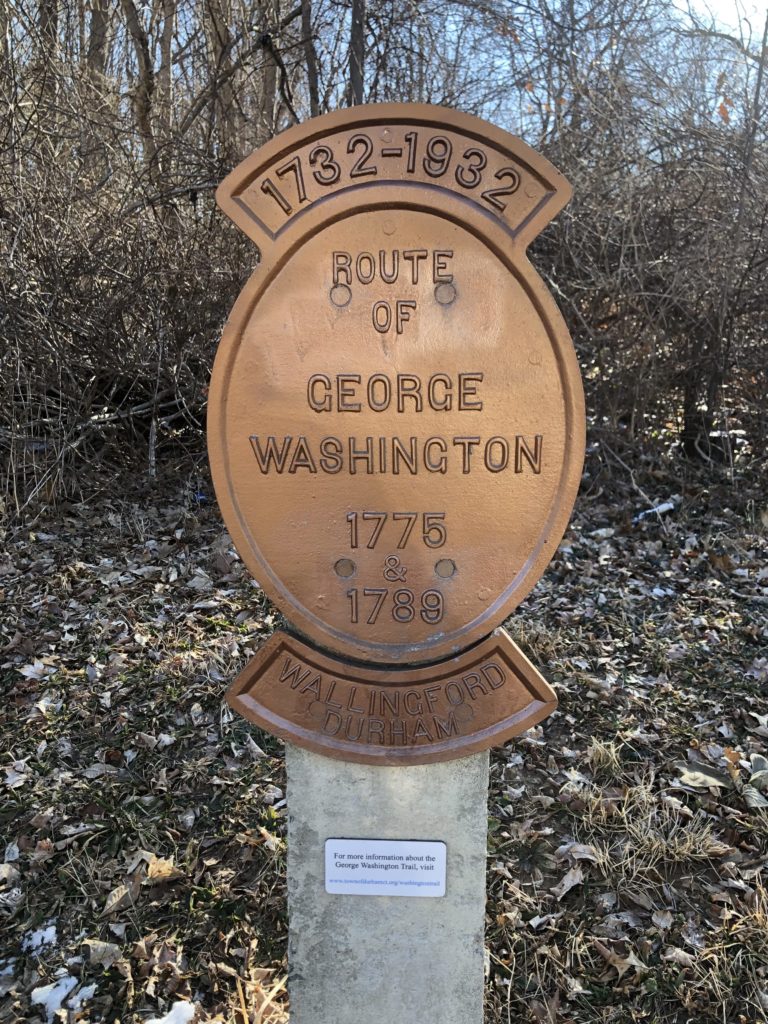
In October 1789 Washington traveled north (blue route) to Wallingford, continuing to Hartford and north to Springfield (yellow route). On his return in November, he traveled southwest from the northeast corner to Hartford to Wallingford (green route) and retraced his route back to New York (blue route). Annotated, “Connecticut from the best authorities,” American Atlas, published by John Reid, 1796. Library of Congress. Lower right: Edward Savage, “President George Washington Esq.” 1793. Library of Congress
By Elizabeth J. Normen
(c) Connecticut Explored Inc. Summer 2022
Subscribe/Buy the Issue!
George Washington visited Connecticut a handful times before, during, and after the Revolutionary War. In his earlier visits, he took the coastal route and, during the war, traversed the state across the middle, east to west. [See “The Conference State,” Fall 2005.]
But in the fall of 1789, six months into his presidency, Washington was on a peacetime mission. Though he was riding a high point in his popularity, this was less victory lap than listening tour and first-hand investigation into the economy of the nascent United States of America. This was the first of three such tours. He visited three of the then-four New England states (Connecticut, Massachusetts, and New Hampshire), skipping Rhode Island, which had not yet ratified the U.S. Constitution, and Vermont (briefly an independent republic), which would join the United States in 1791 (Maine was then part of Massachusetts). He toured Rhode Island in 1790 and the Southern states in 1791.
Washington traveled in a carriage open to the fall New England weather and pulled by four bay horses. A luggage wagon followed behind and, as documented by T.H. Breen in George Washington’s Journey: The President Forges a New Nation (Simon & Schuster, 2016), an enslaved man leading Washington’s white horse Prescott, which Washington would mount before entering a town. Washington’s retinue, according to Yale University’s Catherine Treesh on MountVernon.org, included eight men: two secretaries and six servants. Some, if not all, of the servants were enslaved and had come with Washington from Mount Vernon. On his travels through New England, Washington stayed in public taverns rather than in private homes so as not to show favoritism, he recorded.
Washington documented in his diary conversations with farmers along the way. He noted what they grew, the type of soil, and the crop yield per acre. He particularly noted the development of textile manufacturing. He commented frequently on the quality of the roads—which, given his tolerance for discomfort, likely had more to do with their utility for transporting goods to market.
Washington took five days to cross Connecticut on his way north, entering Greenwich on Friday, October 16, 1789, and, as he wrote in his diary [his spelling is retained]:
… from hence to Fairfield, where we dined and lodged, is 12 miles; and part of it very rough Road… . The superb Landscape, however, which is to be seen from the meeting house of the latter is a rich regalia. We found all the Farmers busily employed in gathering, grinding, and expressing the Juice of their apples; the crop of which they say is rather above mediocrity. The average crop of Wheat they add, is about 15 bushels to the acre from their fallow land—often 20, and from that to 25. The Destructive evidences of British cruelty are yet visible both in Norwalk and Fairfield; as there are the chimneys of many burnt houses standing in them yet. The principal export from Norwalk and Fairfield is Horses and Cattle—salted Beef and Pork—Lumber and Indian Corn, to the West Indies [evidence of Connecticut’s involvement in the slave economy], and in a small degree Wheat and Flour.
Washington typically started each day at sunrise, stopping later for breakfast. He was often met on the way into town by a welcoming committee on horseback, as when he entered Stratford on Saturday the 17th—though by taking “the lower road” into New Haven he missed their counterparts later that day.
At Stratford … I was received with an effort of Military parade; and was attended … by sevl. Gentlemen on horseback. Doctr. [William Samuel] Johnson of the [U.S.] Senate [from Connecticut], visited me here, … . At Stratford they are establishing a manufactory of Duck [cloth], and have lately turned out about 400 bolts. [In] Milford, … there is but one Church, …—but there are Grist and Saw mills, and a handsome Cascade over the Tumbling dam; but one of the prettiest things of this kind is at Stamford, occasioned also by damming the water for their mills ; it is near 100 yds. in width, and the water now being of a proper height, and the rays of the sun striking upon it as we passed, had a pretty effect upon the foaming water as it fell. …We took the lower road through West haven, part of which was good and part rough, and arrived at New Haven before two o’clock; we had time to walk through several parts of the City before Dinner. By taking the lower Road we missed a Committee of the Assembly, who had been appointed to wait upon and escort me into town—to prepare an address—and to conduct me when I should leave the City as far as they should judge proper. The address was presented at 7 o’clock—and at nine I received another address from the Congregational Clergy of the place. Between the rect. of the two addresses I received the Compliment of a visit from the Govr. Mr. [Samuel] Huntington—the Lieut. Govr. Mr. [Oliver] Wolcott—and the Mayor, Mr. Roger Sherman.
Sunday being the Sabbath and “it being contrary to law” in Connecticut, he did not travel. He attended the Episcopal church in the morning, attended by the “Speaker of the Assembly, Mr. Edwards and a Mr. Ingersoll,” and the Congregational church in the afternoon accompanied by the “Governor, the Lieut. Governor, the Mayor, and Speaker.” These dignitaries and others dined with him. Others came to pay their respects in the evening. He noted that a glass works was being established to manufacture bottles.
Washington left New Haven at 6 a.m. on Monday and breakfasted in Wallingford. On his way he reported:
These Sandy lands afford but ordinary Crops of Corn… . The Lands (Stone being less) are in part enclosed with Posts and Rails. At this place (Wallingford) We see the white Mulberry growing, raised from the seed, to feed the silkworm. We also saw samples of lustring [cloth](exceeding good) which had been manufactured from the Cocoon raised in this Town, and silk thread very fine. This, except the weaving, is the work of private families, without interference with other business, and is likely to turn out a beneficial amusement. … About 10 o’clock we left this place, and at the distance of 8 miles passed through Durham. At one [o’clock] we arrived at Middletown, on Connecticut River, being met two or three miles from it by the respectable Citizens of the place, and escorted in by them. While dinner was getting ready I took a walk round the Town, from the heights of which the prospect is beautiful. … Having dined, we set out with the same Escort (who conducted us into town) about 3 o’clock for Hartford, and … we arrived … about sundown. At Weathersfield we were met by a party of the Hartford light horse, and a number of Gentlemen from the same place with Col. Wadsworth at their head, and escorted to Bull’s Tavern, where we lodged.

left: To mark the 1932 bicentennial of Washington’s birth, Durham and Wallingford erected 17 bronze markers along the route Washington likely took on the two occasions, in 1775 and 1789, that he passed
through town. Visit townofdurhamct.org/ washingtontrail.
photo: Elizabeth Normen
The Hartford Courant reported on October 26, “The Illustrious PRESIDENT of the United States with his Suite, arrived in this City Monday last, escorted by the Governor’s Troop of Horse Guards, dressed in an elegant uniform, and by a large number of Gentlemen on horseback.” It printed the official welcome offered by Mayor Thomas Seymour on behalf of the Alderman and Common Council, expressing appreciation that he’d “relinquished the pleasures of retirement” to become the nation’s first president. Washington spent Tuesday, the 20th, in Hartford.
I viewed the Woollen Manufactory at this place, which seems to be going on with spirit. Their Broadcloths are not of the first quality, as yet, but they are good; as are their Coatings, Cassimeres, Serges and Everlastings; of the first, that is, broad-cloth, I ordered a suit to be sent to me at New York—and of the latter a whole piece, to make breeches for my servants [meaning his slaves]. All the parts of this business are performed at the Manufactory except the spinning—this is done by the Country people, who are paid by the cut. … Dined and drank Tea at Col. Wadsworth’s, and about 7 o’clock received from, and answered the Address of, the Town of Hartford.
Washington got a late start on Wednesday because of rain. But he squeezed in a visit with Oliver Ellsworth, the other U.S. senator from Connecticut, in Windsor before arriving in Springfield, Massachusetts late in the day.
Washington returned through Connecticut November 7 to 13, entering at the northeast corner, and traveling southwest through Thompson, Pomfret, Ashford, Mansfield, Bolton, and East Hartford. Of this first leg Washington wrote:
Left … before sunrise, and … breakfasted at one Jacobs’ in Thompson, 12 miles distant; not a good house. Bated [fed]the horses in Pomfret, at Col. Grosvenor’s, distant 11 miles from Jacobs’, and lodged at Squire Perkins’[tavern]in Ashford, (called 10 miles, but must be 12). The first stage, with a small exception, is intolerable bad road, and a poor and uncultivated country, covered chiefly with woods… . From hence to Pomfret there is some Woods and indifferent land, but in general it is tolerably good, and the farms look well.
He remained in Ashford on Sunday, attending morning and evening services, though without pleasure, reporting “heard very lame discourses from [the Congregational minister]Mr. Pond.” Washington departed Monday, arriving in Hartford late in the afternoon. He observed,
We passed through Mansfield, (which is a very hilly country, and the township in which they make the greatest qty. of silk of any in the State,) and breakfasted at one Brigham’s, in Coventry. … Through East Hartford, the country is pleasant, and the land in places very good; in Others sandy and weak. I find by conversing with the farmers along this road, that a medium crop of wheat to the acre is about 15 bushels—of corn, 20—of oats, the same—and in their strong and fresh lands they get as much wheat as they can rye to the acre… . They go more, however, upon grazing than either; and consequently beef, butter and cheese, With pork, are the articles which they carry to market.
At this point, Washington appeared anxious to complete his trip. He took the shortest route and recorded only the barest of details: the distance and where he and his horses ate and slept. From Hartford he traveled through Berlin and then retraced his steps through Wallingford, New Haven, Milford, Fairfield, and Stamford, arriving mid-afternoon on the 13th “at my house at New York, where I found Mrs. Washington and the rest of the family all well.”
Elizabeth Normen is publisher of Connecticut Explored.
Explore!
Revolutionary War: “The Conference State,” Fall 2005
GO TO NEXT STORY
GO BACK TO SUMMER 2022 CONTENTS
